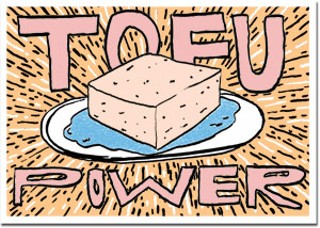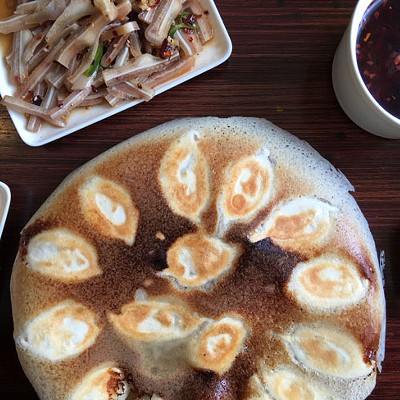At the Soy Deli stand at the Halifax Farmers' Market, George Pickford points to a sign taped to the counter: "Notice! Our produce is still available at Pete's Frootique in Halifax and Bedford."
"We just want people to know they can still get our tofu," he says.
George's wife, Anna Anderson, started Acadiana Soy in 1994 and runs it from her Annapolis Valley farm. With two employees, she does everything from soaking, grinding and boiling the beans, to separating the curdled soy milk into blocks and packaging it.
Anderson has sold between 500 and 600 packages of tofu a week to grocery and health-food stores, and market-goers in Nova Scotia. But as of September 1, she's stopped supplying tofu to her five Atlantic Superstore locations---three in Halifax.
Every year, Anderson's tofu is inspected by the Canadian Food Inspection Agency. She says bacteria levels in her tofu vary and this summer they tested higher than the allowed amount, and her inspector wanted her to do something about it.
Steven Owen, an industrial technical adviser for the Department of Food Science and Technology in Halifax, went to Anderson's farm to discuss her options. Larger tofu makers pasteurize packaged tofu by boiling it in water, which kills all the bacteria and extends the product's shelf life. The danger is that boiling changes the properties of the tofu, and smaller shops like Anderson's don't want to compromise freshness.
Anderson tried boiling---and noticed her tofu was more crumbly and had less flavour. Although the boiled product tested almost completely bacteria-free and lasted much longer, she had concerns about the process.
"I just don't feel right about it," she says. "I don't know the health risks of boiling tofu in plastic." Anderson says no customer has ever complained of getting sick and her product has never been recalled.
"I feel pretty discouraged and helpless," she says. "I know we have a safe product. I'm there almost 100 percent overseeing the entire process."
Another issue is Anderson's health. She suffers from chronic arthritis and the extra day of work to pasteurize the tofu would mean higher costs for more employees and overhead. "To survive in the food business,it makes sense," she says. "But I'm at the end of a career and with the other factors affecting me, I don't want to make those changes."
Anderson discovered that by lowering her tofu's three-week shelf life to 10 days, her product would be in another regulatory category because bacteria have less time to grow. She's therefore decided to reduce her shelf life and plans to tell the stores and restaurants she wholesales to about the change---and offer a guaranteed sale where she gives them credit for tofu they don't sell.
Anderson says the Superstores, where she makes almost half her sales, are too difficult to deal with. "They don't have a head office in Nova Scotia," she says. "It's impossible to get a hold of someone who can do something."
So she opted to write a letter to all Superstores, chalking the problem up to pricing and her physical state, and downsized her operation to 400 packages of tofu. Anderson hopes the tofu business survives with farmers' market and local business sales, but has come to terms with possibly shutting down.
She'd miss the market most, where she sells about 200 packages each week. "People come up to me and tell me what's going on in their lives," she says. "One man who comes every week told me 'thanks for being here.' I don't know what I'd do if I couldn't sell there."












